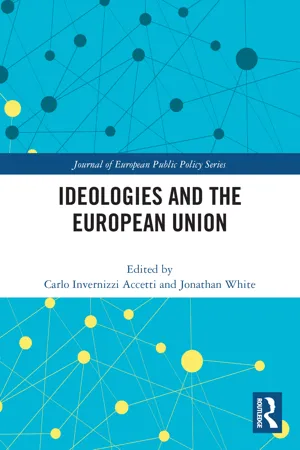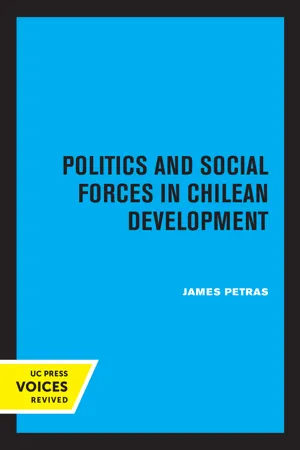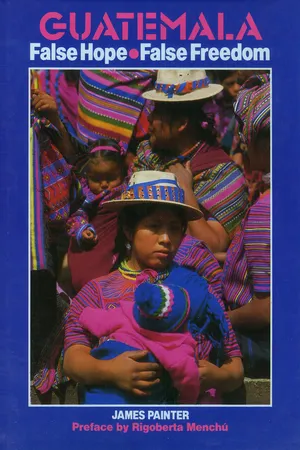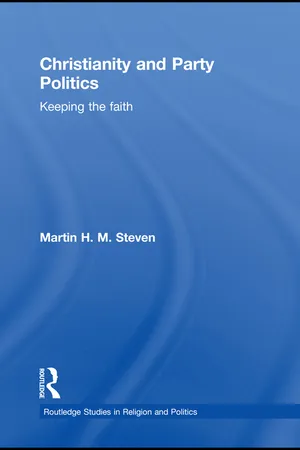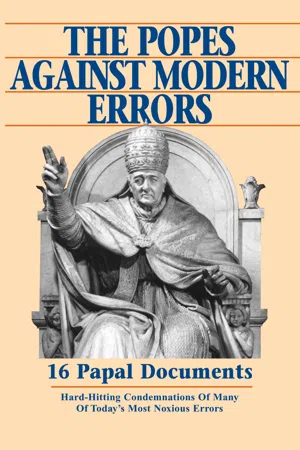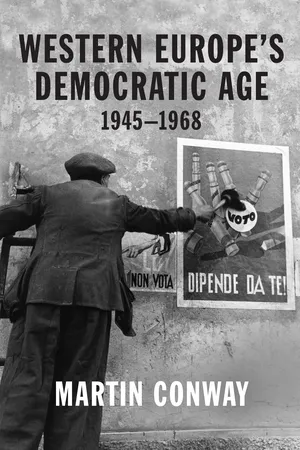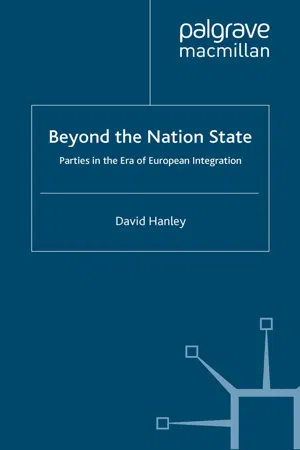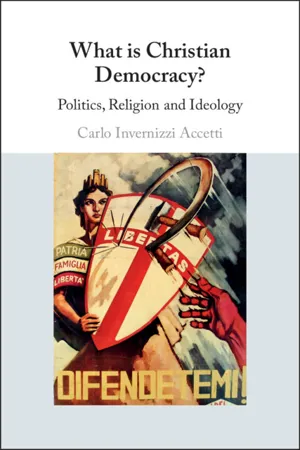Politics & International Relations
Christian Democracy
Christian Democracy is a political ideology that seeks to integrate Christian values and principles with democratic governance. It emphasizes social justice, solidarity, and the common good, while also advocating for a mixed economy and a strong civil society. Christian Democratic parties have been influential in Europe and Latin America, promoting a centrist approach to politics that combines religious ethics with democratic ideals.
Written by Perlego with AI-assistance
Related key terms
1 of 5
8 Key excerpts on "Christian Democracy"
- eBook - ePub
- Carlo Invernizzi Accetti, Jonathan White, Carlo Invernizzi Accetti, Jonathan White(Authors)
- 2021(Publication Date)
- Routledge(Publisher)
This concerns the definition of Christian Democracy, and in particular of the specific concepts I will be extrapolating from this ideological tradition for the purpose of interpreting the EU’s institutional framework. As in the case of all ideological traditions, there is an ongoing scholarly debate over what can be considered to count as a properly ‘Christian Democratic’ set of principles and values (on this point, see: Durand, 1995; Kalyvas, 1996; Kselman & Buttigieg, 2003; Kalyvas & Van Kersbergen, 2010). Adopting a ‘morphological’ approach drawn from Michael Freeden’s seminal work on political ideologies, it nonetheless seems possible to identify a ‘core’ of reciprocally defining concepts which demarcate the Christian Democratic ideology as a specific constellation of meanings attached to key political notions (on this point, see for instance: Freeden, 1996, 2006). On this basis, I have recently attempted to systematize the substantive content of the Christian Democratic ideology in a book-length monograph entitled precisely What is Christian Democracy? which applies Freeden’s methodology to the Christian Democratic ideological tradition (see: Invernizzi-Accetti, 2019). This paper therefore draws on my previous research on the topic, while also extending its scope by demonstrating the heuristic value of a morphological reconstruction of the Christian Democratic ideology’s core concepts for the purpose of interpreting the distinctive nature of the European Union’s institutional framework. Polity Type: Beyond Federalism And Intergovernmentalism The contemporary academic debate on the type of polity created by EU institutions is dominated by two conceptual categories: federalism and intergovernmentalism - James Petras(Author)
- 2023(Publication Date)
- University of California Press(Publisher)
The ideological focus of the Christian Democrats is on in- tegration, mobilization, and development. The ideal of com- 1 Julio Silva Solar and Jacques Chonchol, El desarrollo de la nueva sociedad en América Latina (Santiago, Chile: Editorial universitaria, 1965). 2 Jaime Castillo Velasco, Las fuentes de la democracia cristiana (Santiago, Chile: Editorial del pacifico, 1963). Christian Democracy 199 munity replaces that of the competitive individual. Mass participation is emphasized instead of party competition. Technological and industrial expansion promoted by govern- ment planners and engineers is stressed, rather than depen- dence on the market mechanism. As with other ideological movements, there is a considerable gap between what the movement proposes and what policies are actually pursued, and I am less concerned here with vague statements of party ideology than with the political practices of the Christian- Democratic government. The political character of Christian Democracy as a move- ment of national regeneration can be analyzed on two levels: that of political control and political participation, and that of the social choices it makes in pursuing a development pol- icy. There are also two distinct tendencies in the party: the populist and the corporatist. A corporate society would be one dominated by elites who share common values and identify their interests with main- taining the socioeconomic status quo. It can be defined as a society in which there are a plurality of interest groups, each controlled from the top, and in which individuals low in the hierarchy of an interest group (or outside one) have little opportunity to discuss or promote issues that might conflict with the society's established policies. In a corporate society, unlike a totalitarian state, a plurality of interest groups exist, and bargaining between elites, in the context of shared values and interests, takes place.- eBook - PDF
- James Painter(Author)
- 1987(Publication Date)
- LAB (Latin America Bureau)(Publisher)
Despite the moderate image that Vinicio Cerezo or other Christian Democrat politicians adopted for local or foreign consumption, the party undoubtedly represented the 'civilised right'. What is Christian Democracy? Christian Democracy is probably best known because of the present-day strength of European Christian Democrat parties in West Germany, Italy, Holland and Belgium. Typically, European Christian Democrat parties were founded as a strongly pro-capitalist and anti-communist alternative to social-democrat and socialist parties in the reconstruction of Europe after the Second World War. Drawing on the European Catholic tradition and enjoying the support of important industrial and economic groups, they soon became the dominant conservative political parties in many countries of Western Europe. The central body of Christian Democrat thinking springs from the social doctrine of the Catholic Church. This was first systematically expounded at the end of the 19th century in the encyclical of Pope Leo XIII, Rerum Novarum, in which the Pope criticised the abuses of liberal capitalism but also condemned socialism. He supported the social obligations of private property, and proposed a system of 'distributive justice' which would bring together or conciliate social classes, which he denied were in structural conflict with one another. The idea of including Christian solutions to social problems was further developed by Pope Leo's successors: Pope Pius XI attacked the effects of laissez-faire capitalism and defended the workers' rights to 60 Guatemala: False Hope, False Freedom organise, while Pope Pius XII (1939-58) encouraged the study of social sciences and the formation of Christian trade unions and Catholic Action groups, again to meet the challenge of strong com-munist movements in Western Europe. - eBook - ePub
Christianity and Party Politics
Keeping the faith
- Martin Steven(Author)
- 2010(Publication Date)
- Routledge(Publisher)
This is helpful as it allows us to see, albeit briefly, how the British parties fit in to a more global picture. An obvious place to start is the Christian Democratic movement of Europe – for example, Germany, the third largest economy in the world, is run by Christian Democrats, whose core aim is to demonstrate the ‘Christian understanding of humans and their responsibility toward God’ (see Der Spiegel 2010). We also need to look at the United States where some argue that the Republican Party has become a quasi-confessional party owing to the strength of correlation that now exists between the many evangelical Christians and the party. 5 According to Van Kersbergen, Christian Democracy is concerned with a ‘religiously inspired model of social reform which is both social and capitalist’ (1994: 42). Indeed, he argues that ‘religion accords the movement an unparalleled opportunity to adapt to changing circumstances’ (1994: 31) owing to its ‘bipolar’ and ‘multidimensional’ profile (1994: 37) – something with which the present author would enthusiastically agree. Often accused of lacking ideological clarity, Christian Democrats nevertheless tend to be associated with the centre-right of the political spectrum. In relation to denomination, it is worth reiterating, then, that the UK is therefore the reverse of much of Europe where Catholics empathise with parties of the left, not the right. One does not need to be religious to vote Christian Democrat but party programmes do continue to stress the legacy and values of the Christian Church. 6 As Meny and Knapp highlight (1998: 72), parties continue to place great stress on the values of education and morality, even if Catholic Church law on marriage, divorce and contraception no longer automatically dominates sections of party programmes - eBook - ePub
The Popes Against Modern Errors
16 Papal Documents: Hard-Hitting Condemnations of Many of Today's Most Notorious Errors
- Anthony J. Mioni(Author)
- 1999(Publication Date)
- TAN Books(Publisher)
4. This work of popular aid had, at first, no name of its own. The name of Christian Socialism, with its derivatives, which was adopted by some was very properly allowed to fall into disuse. Afterward, some asked to have it called the Popular Christian Movement. In the countries most concerned with this matter, there are some who are known as Social Christians. Elsewhere, the movement is described as Christian Democracy and its partisans as Christian Democrats, in opposition to what the Socialists call Social Democracy. Not much exception is taken to the first of these two names, i.e., Social Christians, but many excellent men find the term Christian Democracy objectionable. They hold it to be very ambiguous and for this reason open to two objections. It seems by implication covertly to favor popular government and to disparage other methods of political administration. Secondly, it appears to belittle religion by restricting its scope to the care of the poor, as if the other sections of society were not of its concern. More than that, under the shadow of its name there might easily lurk a design to attack all legitimate power, either civil or sacred. Wherefore, since this discussion is now so widespread, and so bitter, the consciousness of duty warns Us to put a check on this controversy and to define what Catholics are to think on this matter. We also propose to describe how the movement may extend its scope and be made more useful to the commonwealth.Social Democracy Defined5. What Social Democracy is and what Christian Democracy ought to be, assuredly no one can doubt. The first, with due consideration to the greater or less intemperance of its utterance, is carried to such an excess by many as to maintain that there is really nothing existing above the natural order of things, and that the acquisition and enjoyment of corporal and external goods constitute man’s happiness. It aims at putting all government in the hands of the masses, reducing all ranks to the same level, abolishing all distinction of class and finally introducing community of goods. Hence, the right to own private property is to be abrogated, and whatever property a man possesses, or whatever means of livelihood he has, is to be common to all.Christian Democracy Examined6. As against this, Christian Democracy, by the fact that it is Christian, is built, and necessarily so, on the basic principles of divine faith, and it must provide better conditions for the masses, with the ulterior object of promoting the perfection of souls made for things eternal. Hence, for Christian Democracy, justice is sacred; it must maintain that the right of acquiring and possessing property cannot be impugned, and it must safeguard the various distinctions and degrees which are indispensable in every well-ordered commonwealth. Finally, it must endeavor to preserve in every human society the form and the character which God ever impresses on it. It is clear, therefore, that there is nothing in common between Social and Christian Democracy. They differ from each other as much as the sect of Socialism differs from the profession of Christianity. - eBook - ePub
Western Europe’s Democratic Age
1945–1968
- Martin Conway(Author)
- 2020(Publication Date)
- Princeton University Press(Publisher)
Much of the historical writing about both Christian Democracy and Socialism in the post-1945 era has had a somewhat teleological (and occasionally self-congratulatory) character, dominated by self-contained narratives of the path that each political movement followed into democracy, and the ways that these movements in turn enriched the content of that democracy. 10 This approach reflects the way in which these accounts have often been written from within their respective political traditions, with the consequence that they have been primarily concerned with reconstructing the trajectories of their political traditions, rather than the democracy that they made together. 11 In contrast, this chapter will explore the understandings of democracy advanced by Socialists and Christian Democrats through the prisms of their past history, their ideological declarations, and—perhaps most importantly—their programmes for the future construction of democracy. These threefold claims regarding past, present, and future could at times be convergent and complementary, especially when directed against Communism, but they were more frequently dialectical as Socialists and Christian Democrats defined their positions against each other, and thereby advanced their claims to ownership of democracy. 12 Debates about past history were unsurprisingly key to the politics of legitimacy in liberation Europe. For Socialists and Christian Democrats—as indeed for the advocates of other political traditions, including Communism—it was politically and emotionally essential to locate themselves within historical narratives that privileged their own role in the past struggles and present victory of democracy. This was not, however, a straightforward process for Catholics or Socialists - eBook - PDF
Beyond the Nation State
Parties in the Era of European Integration
- D. Hanley(Author)
- 2007(Publication Date)
- Palgrave Macmillan(Publisher)
It is possible to identify a number of features within the CD model. Most parties subscribed to the ideology of social personalism, derived from the writings of philosophers like Jacques Maritain or Emmanuel Mounier (Dierickx, 1994). This type of thought places the person at the centre of the political process. In contrast to the individual who inhabits liberal theory and who is essentially a competitive being, the person is open to others and only flourishes truly in a community; this term includes the family, neighbourhood, school, workplace, nation and Europe. None of these levels of belonging is necessarily superior to the other, which explains why CDs have less emotional difficulties with European integration than other party families. As well as enjoying multiple identities, the person recognises the need for others to flourish; persons live in a world of mutual obligations and solidarities. Social justice is therefore an important part of personalism and has obvious policy implications. At the same time, the person, respecting the liberty of others, is committed to democracy, and any programme of social justice must be enacted in a democratic framework. This type of thought clearly downplays Marxist concepts of class-conflict, believing that compromises can always be found between contending interests. Christian Democrats and Allies 87 This flexible ideology proved well suited to a distinct style of CD government, usually undertaken in coalition and often with social democratic partners/rivals. Social policy was at the centre of it (Kers- bergen, 1995), and it had a strongly redistributive tone, privileging the family rather than the individual as the locus of redistribution. In cultural or educational policy, the CD parties were usually able to broker deals with their socialist or secularist partners. - eBook - PDF
What is Christian Democracy?
Politics, Religion and Ideology
- Carlo Invernizzi Accetti(Author)
- 2019(Publication Date)
- Cambridge University Press(Publisher)
“The state,” Caldera writes, “cannot be inhibited before social injustice and necessity; but neither can it substitute for human 300 History and Future Prospects persons and social groups by imposing its arbitrary will . . . Thus, Chris- tian Social Doctrine has always maintained that the organizing principles of state action ought to be, on one hand, the principle of responsibility, which requires it to direct, coordinate and control the activities of indi- viduals and groups, while also supplying those goals and social services they are incapable of providing for on their own; and on the other hand the principle of subsidiarity, which obliges it to support, assist and com- plete private initiative, whenever the latter is insufficient for achieving their social goals” (ibid., 60–61). The main element of continuity with the party’s ideological roots – which Caldera relies on to mark an element of distinction with the ruling AD party – lies in a forthright reaffirmation of the “Christian inspiration” of its political platform. To this effect, for instance, Caldera asserts that: “We are Christians, and we are democrats. But, more than that, we are Christian Democrats. This implies, before anything else, a general phil- osophy of human and political life, based on a distinct spirituality” (ibid., 24). Later in the document Caldera also pays homage to traditional Christian Democratic doctrine, adding that: “Amongst the ideas we rely upon that are based on a Christian inspiration we should also recall, as foundational: the inherent dignity of the human person, the primacy of the common good and the perfectibility of civil society” (ibid., 52). It is difficult, however, not to form the impression that these references to the party’s Christian identity are added here almost as an afterthought, and therefore that their function is largely symbolic and deferential, rather than truly constituting the animating spirit of the political program set forth in this document.
Index pages curate the most relevant extracts from our library of academic textbooks. They’ve been created using an in-house natural language model (NLM), each adding context and meaning to key research topics.
